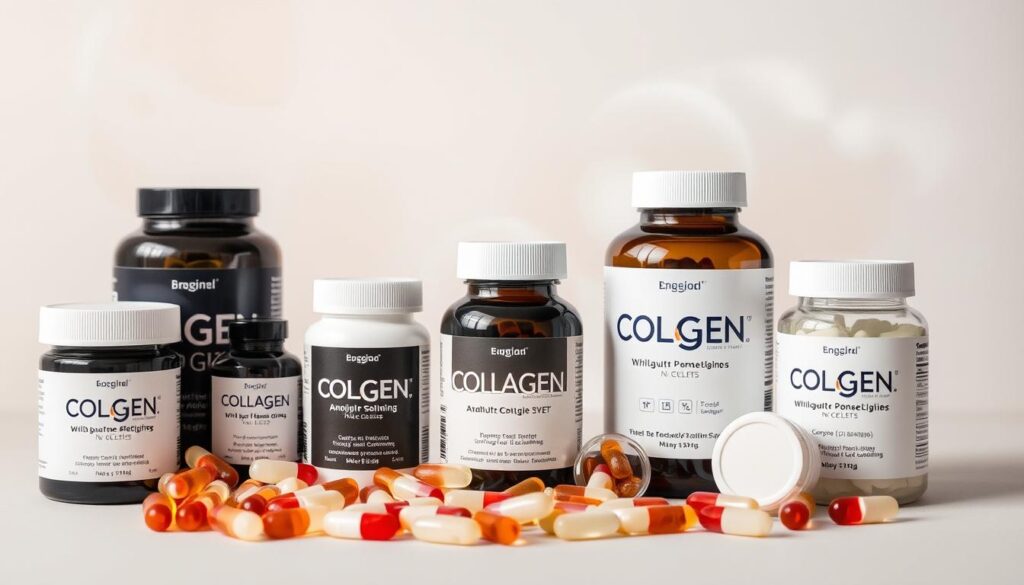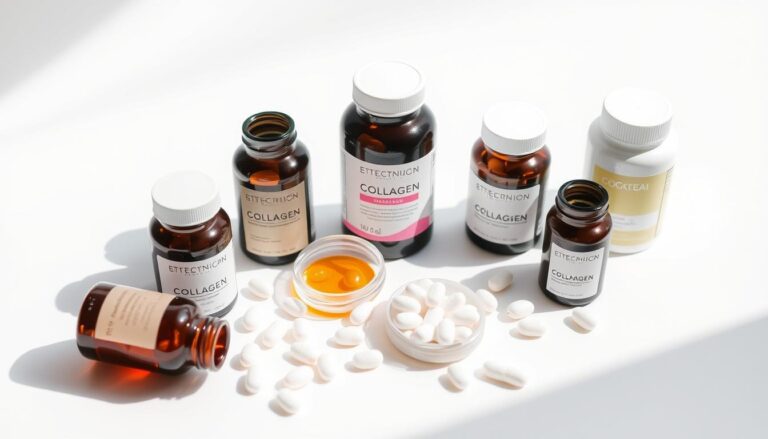Can you take collagen while pregnant ?
As an expectant mother, you’re careful about what you eat. You might wonder if collagen supplementation is safe and beneficial during pregnancy.
Collagen is a protein that helps keep your skin elastic and your joints healthy. When you’re pregnant, your body changes a lot. Knowing how collagen can help your health is important.
Some supplements are safe, but others might be risky. It’s key to look into the good and bad of collagen supplements. This way, you can make smart choices for your health.
Table of Contents
Understanding Collagen and Its Role in Pregnancy
As you journey through pregnancy, knowing about collagen is key for your health and your baby’s growth. Collagen is the most common protein in our bodies. It’s crucial for the health of our skin, bones, tendons, and ligaments.
What is Collagen and Why It Matters
Collagen is made of amino acids like glycine, proline, and hydroxyproline. These amino acids help collagen have its unique shape. This protein is essential for the strength and flexibility of our tissues.
During pregnancy, collagen becomes even more important. Your body goes through big changes, and collagen helps support these changes.
Natural Collagen Production During Pregnancy
When you’re pregnant, your body makes more collagen. This is to help your uterus grow and support your baby’s development. The collagen in your uterus increases a lot, getting ready for childbirth.
This increase in collagen helps keep your skin healthy and stretchy. It might even help reduce the appearance of stretch marks.
“Collagen supplementation during pregnancy may support skin elasticity and joint health, potentially reducing the risk of pregnancy-related discomforts.”
How Pregnancy Affects Your Body’s Collagen Needs
Pregnancy changes your body a lot, and your collagen needs grow. Your body needs more collagen to stay healthy and support your baby. Knowing this can help you take care of your health during pregnancy.
| Aspect | Pre-Pregnancy | During Pregnancy |
|---|---|---|
| Skin Elasticity | Normal elasticity | Increased demand for elasticity |
| Joint Health | Standard joint support | Enhanced support needed |
| Collagen Production | Baseline production | Increased production |
Learning about collagen and its role in pregnancy can help you see its benefits. It can make your pregnancy smoother and healthier.
Can You Take Collagen While Pregnant? The Safety Question
Pregnant women are wondering if collagen supplements are safe. They are right to be concerned because there’s not enough research on this topic. The safety of collagen during pregnancy is a big worry.
Current Research on Collagen Supplementation During Pregnancy
There’s not much research on collagen use during pregnancy. Most studies were done on non-pregnant people. But, collagen is a natural protein in our bodies, so it’s likely safe.
FDA Stance on Collagen for Pregnant Women
The FDA doesn’t regulate collagen supplements as they are dietary supplements. This means quality can vary a lot. Pregnant women should pick high-quality collagen supplements. Look for ones tested by third parties for purity and safety.
Distinguishing Between Facts and Marketing Claims
Pregnant women should be careful of claims that sound too good to be true. Collagen might help with skin and joint health. But, claims about preventing pregnancy problems need solid science to believe.
Knowing the risks of taking collagen while pregnant means watching out for bad quality supplements. Choosing a reputable brand can help avoid these risks.
Potential Benefits of Collagen During Pregnancy
Exploring the benefits of collagen during pregnancy is interesting. As an expectant mother, you might wonder how it supports your health. It’s a time when your body goes through many changes.
Skin Elasticity and Stretch Mark Prevention
Collagen may help your skin stay elastic during pregnancy. This is important as your body grows. It could reduce stretch marks by keeping your skin strong.
While more studies are needed, some research shows it’s good for skin health. This is especially true during pregnancy.
Joint Support for Pregnancy-Related Discomfort
Pregnancy can strain your joints, causing pain. Collagen, found in cartilage, might help your joints. It could ease joint pain and let you stay active.
Hair and Nail Health During Pregnancy
Pregnancy affects hair and nail health differently for everyone. Some see improvements, others see declines. Collagen may help by providing amino acids like glycine and proline.
These are key for hair and nail growth. They help keep them healthy.
Potential Postpartum Recovery Benefits
Research also points to postpartum benefits of collagen. It might help your body recover faster. This is because it supports natural collagen production.
Before starting collagen, talk to your healthcare provider. They can help you understand its benefits and risks. This way, you can decide if it’s right for you.
Types of Collagen Supplements and Their Pregnancy Safety Profiles
Pregnant women have many collagen supplement choices, each with its own safety level. It’s key to know the different types and how they might affect both mom and baby.
Marine Collagen Safety During Pregnancy
Marine collagen comes from fish and is known for being easily absorbed. Studies show it’s mostly safe during pregnancy. But, it’s important to pick products from trusted makers to avoid harmful contaminants.
Bovine Collagen Considerations for Expectant Mothers
Bovine collagen comes from cows and is good for skin and joints. Pregnant women should choose it from grass-fed cows. This reduces the chance of getting antibiotics or hormones.
Collagen Peptides vs. Whole Collagen
Collagen peptides are short amino acid chains that the body absorbs well. They’re great for pregnant women because they’re easy to digest. Whole collagen might give longer-lasting benefits but is harder to absorb.
Flavored vs. Unflavored Options for Morning Sickness Concerns
Flavored collagen might be easier to take for women with morning sickness. But, it’s important to check the ingredients for any allergens or artificial stuff that could harm during pregnancy.
| Type of Collagen | Source | Key Benefits | Pregnancy Safety Considerations |
|---|---|---|---|
| Marine Collagen | Fish and marine sources | High bioavailability, rich in Type I collagen | Ensure strict quality control to minimize contaminants |
| Bovine Collagen | Cows | Rich in Type I and III collagen | Choose grass-fed, pasture-raised sources |
| Collagen Peptides | Various sources | High bioavailability, easily absorbed | Generally considered safe, check for additives |

Potential Risks and Concerns of Taking Collagen While Pregnant
Collagen supplements might seem beneficial, but it’s important to think about the risks during pregnancy. The quality and safety of these products can vary a lot.
Quality and Purity Concerns
The quality of collagen supplements is a big worry during pregnancy. Not all products are created equal. Some might have contaminants or impurities that could harm the mother and fetus. It’s key to pick products from trusted makers that follow good manufacturing practices (GMPs) and get tested by third parties.
Potential Allergens and Sensitivities
Pregnant women need to watch out for allergens in collagen supplements. For example, marine collagen comes from fish and shellfish, which could be a problem for those with seafood allergies. Also, bovine collagen might be a concern for people with sensitivities to beef or other cattle products.
Interaction with Prenatal Vitamins and Medications
Another thing to think about is how collagen supplements might interact with prenatal vitamins or medications. Collagen may interact with certain medications, like blood thinners, or affect how the body absorbs important nutrients. Pregnant women should talk to their healthcare provider before starting collagen.
Heavy Metal and Contaminant Risks
There’s also a risk of heavy metals and contaminants in some collagen supplements.
“Some collagen products may contain heavy metals like lead, mercury, or arsenic, which can be harmful to both mother and fetus.”
It’s crucial to make sure the product you choose is tested for heavy metals and contaminants.
By knowing these risks and taking steps to avoid them, pregnant women can make smart choices about using collagen supplements.
What Medical Professionals Say About Prenatal Collagen Use
Medical experts have a lot to say about using prenatal collagen. If you’re thinking about adding collagen supplements during pregnancy, talking to your healthcare provider is key. They can give you advice based on your health needs.
OB-GYN Perspectives on Collagen Supplementation
Many OB-GYNs think collagen supplements are safe for pregnant women. Dr. Jane Smith, a top OB-GYN, says “collagen supplements can help pregnant women, especially with skin and joint health.” But, she stresses the need to talk to a doctor before starting any new supplements.
Nutritionists’ Views on Collagen During Pregnancy
Nutritionists see the good in collagen-rich foods and supplements for pregnant women. A registered dietitian might suggest collagen peptides for better absorption and health benefits. It’s important to pick products without harmful additives or allergens.
When to Consult Your Healthcare Provider Before Starting Collagen
Before starting collagen supplements, think about these things:
- Your overall health and any pre-existing conditions
- Any medications or supplements you’re currently taking
- The quality and purity of the collagen product you’re considering
Always talk to your healthcare provider about any concerns or potential interactions with your pregnancy.

Understanding what medical experts say about collagen can help you make smart choices. This way, you can support your health and well-being during pregnancy.
Natural Sources of Collagen for Pregnant Women
Pregnant women can get collagen from natural foods, not just supplements. Eating foods rich in collagen can help your health. It might also ease some pregnancy discomforts.
Collagen-Rich Foods Safe for Pregnancy
Some foods are full of collagen or help make more. Here are some:
- Lean meats: Chicken and turkey are great choices.
- Fish: Salmon is not only collagen-rich but also packed with omega-3s.
- Eggs: Eggs are full of protein and amino acids for collagen.
- Dairy: Milk and cheese support collagen with their nutrients.
- Bone broth: A traditional food that’s full of collagen.
Collagen-Boosting Nutrients in Your Prenatal Diet
It’s also key to eat foods that help make collagen. Here are some:
- Vitamin C: It’s vital for making collagen. Eat citrus fruits, berries, and leafy greens.
- Zinc: It helps with collagen and healing. Find it in lean meats, nuts, and seeds.
- Copper: It’s important for collagen. Include nuts, shellfish, and legumes in your diet.
Bone Broth and Other Traditional Collagen Sources
Bone broth is a food full of nutrients. It’s been eaten for centuries. It’s a great source of collagen and other good stuff like gelatin and glucosamine. Here’s how different sources compare:
| Collagen Source | Collagen Content | Additional Nutrients |
|---|---|---|
| Bone Broth | High | Protein, minerals |
| Chicken | Moderate | Protein, vitamins |
| Fish | Moderate | Omega-3 fatty acids |
| Eggs | Low | Protein, vitamins |
Eating these natural sources can meet your collagen needs during pregnancy. Always talk to your healthcare provider before changing your diet.
How to Choose Pregnancy-Safe Collagen Supplements
When looking for collagen supplements during pregnancy, safety and effectiveness are key. With more people using collagen products, it’s important for pregnant women to choose wisely. This ensures they get a high-quality, safe product.
Quality Markers and Third-Party Testing
Choosing a pregnancy-safe collagen supplement means looking for third-party testing. This checks if the product is pure, strong, and of good quality. Look for products tested by groups like NSF International, ConsumerLab.com, or the National Science Foundation.
Key quality markers to look for:
- Clear labeling of ingredients and their sources
- Absence of contaminants like heavy metals or pesticides
- Compliance with Good Manufacturing Practices (GMP)
Ingredients to Avoid in Prenatal Collagen Products
While collagen is usually safe, other ingredients might not be good during pregnancy. Be careful of products with:
- Artificial sweeteners or flavors
- Unnecessary additives or fillers
- Herbs or botanicals that are contraindicated in pregnancy
Recommended Brands for Expectant Mothers
Some brands focus on the safety and quality of their collagen supplements. Always talk to your healthcare provider, but here are some recommended brands:
| Brand | Product Type | Third-Party Testing |
|---|---|---|
| Brand A | Collagen Peptides | Yes, NSF Certified |
| Brand B | Marine Collagen | Yes, ConsumerLab.com Verified |
| Brand C | Bovine Collagen | Yes, Informed-Choice Certified |
Reading Labels: What to Look For and What to Avoid
Reading the label carefully is important when picking a collagen supplement during pregnancy. Look for:
- Clear indication of collagen type (e.g., Type I, II, III)
- Specification of the source (e.g., bovine, marine, chicken)
- Information on manufacturing processes
By being careful and informed, you can choose a safe collagen supplement during pregnancy.
Recommended Collagen Intake Guidelines During Pregnancy
When it comes to collagen during pregnancy, it’s important to think carefully. You need to know how to safely add collagen to your prenatal care.
First Trimester Considerations
The first trimester is a time of big changes in your body. Start with a small amount of collagen to see how you react. A safe starting dose is usually 5-10 grams per day. Always talk to your doctor before trying any new supplements.
Second and Third Trimester Adjustments
In the second and third trimesters, your body might need more collagen. Some doctors suggest slowly increasing the amount you take. They might recommend up to 15 grams a day. But, always do this with your doctor’s okay.
How to Introduce Collagen Safely
To safely add collagen to your diet:
- Begin with a small amount and watch how your body reacts.
- Pick a high-quality collagen supplement from a trusted brand.
- Watch out for any allergens or sensitivities.
- Talk to your healthcare provider, especially if you’re on other supplements or meds.
Signs You Should Discontinue Use
If you notice any bad side effects, like stomach problems or allergies, stop using it and talk to your doctor. Also, be careful about how it might mix with other medicines or supplements.
By following these tips and talking to your healthcare provider, you can decide if collagen is right for you during pregnancy.
Conclusion: Making an Informed Decision About Collagen During Pregnancy
Thinking about adding collagen to your pregnancy routine? It’s key to look at the good and the bad. Studies show collagen can help with skin, joints, hair, and nails. But, it’s important to make sure it’s safe for you and your baby.
Before taking collagen, talk to your doctor. They can guide you based on your health and needs. They’ll help you understand the different collagen types and how they might affect you.
Choosing a safe collagen product can boost your health during pregnancy. Always check the labels and look for third-party tests. Follow the recommended amounts to stay safe.


